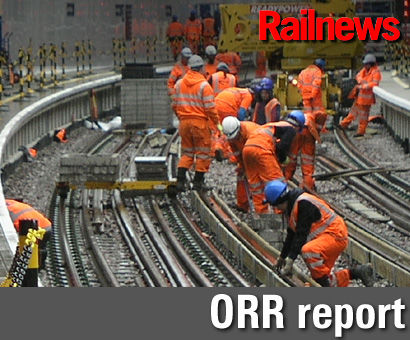THE rail regulator has said that Network Rail has breached its operating licence and now faces a fine of £2 million.
The Office of Rail and Road said it had examined Network Rail's performance in relation to Southern, Govia Thameslink Railway and Scottish operators in 2014-15.
For Southern and Govia Thameslink, the ORR said there were 'serious weaknesses' in timetables, and that some of the data used to calculate train timings was flawed. This meant that there were major problems at London Bridge in particular, where pairs of platforms are being progressively closed to allow the station to be rebuilt as part of the Thameslink Programme. Network Rail had also failed to communicate effectively with the train operators.
In Scotland, there were 'numerous errors' in the December 2014 timetable caused by a number of factors including a lack of quality assurance and detailed planning.
Network Rail has responded by pointing out that improvements have been made in the past few months, while the RMT said the idea of fining the public-sector company was 'ludicrous'.
ORR chief executive Richard Price said: “Our investigation has identified important issues that Network Rail, working with operators, needs to address to improve performance for passengers on these routes. Our analysis shows that the company needs to develop a much better understanding of the impact of timetabling on the reliability of services and on rail users.
“These serious issues have caused severe disruption and frustration for passengers, most notably affecting services at and around London Bridge. ORR is therefore imposing a £2m fine on Network Rail – a decision we did not take lightly. The scale of the delays suffered by passengers was central to our decision to fine. The penalty sends a clear message to the Network Rail Board; Network Rail must urgently rectify these errors and deliver the reliability of services that passengers have paid for.”
However, there was a brighter note as well. The ORR said it had found no 'systemic weaknesses' in the way Network Rail handled performance. This verdict is in contrast to a bleak ORR assessment of Network Rail's management of major projects, which was published last week. These problems may also constitute a separate breach of Network Rail's licence, but the company has an opportunity to offer explanations before a judgement is made.
The ORR also conducted a separate safety investigation into the disruptions at London Bridge which found that while passenger information and pedestrian flow management could have been better, safety was not compromised.
The ORR has proposed a £2 million fine in relation to Network Rail’s handling of GTR and Southern services, but the company has the opportunity to offer reparations to affected passengers, instead of having to pay the fine.
Network Rail managing director for network and operations Phil Hufton said: “At the start of this year we had a number of problems that caused passengers disruption and frustration and we apologise for this. Since then we have proactively invested over £11m to improve performance for Southern and Thameslink passengers. This investment, which has seen the introduction of a revised timetable, improved equipment, the deployment of rapid-response maintenance teams at London Bridge as well as new information screens and better passenger information, is paying dividends and passenger service reliability has now improved by almost 12 per cent since January.
“While the nuts and bolts of our infrastructure are the most reliable they’ve even been, severe congestion caused by record numbers of trains and passengers makes delivering a consistently reliable service a daily challenge for ourselves and the train operators. At London Bridge we are undertaking the biggest and most complex station and track redevelopment ever attempted on Britain’s railways – while simultaneously continuing to keep services running.
“As we are now a public sector organisation, the fine must come from within our existing budget, and will mean a reallocation of existing resources to pay it.”
Meanwhile, the RMT said it was opposed to the fine. The union's general secretary Mick Cash said: "With Network Rail a publicly owned body, the ORR imposing multi-million pound fines is effectively the taxpayer fining themselves and that is a ludicrous way to run a railway. The fines will have to be paid for by axing works or cutting staff, creating a vicious cycle of decline that is self-defeating and will just mean more fines and more cuts in the future which is a nonsense.
"There are deep-seated issues around fragmentation and a proliferation of contractors and agencies on our tracks , alongside a national skills shortage and budget pressures, which are compromising infra-structure projects and which will not be dealt with by handing out fines that simply compound the problems."
The Campaign for Better Transport was also critical. CBT spokesman Martin Abrams said: "It's right there are penalties for poor performance, but fines are meaningless if things don't get better for passengers. Network Rail and the train operators need to work together to put in place proper plans to deal with the disruption caused by rail improvements so passengers aren't left paying the penalty."


